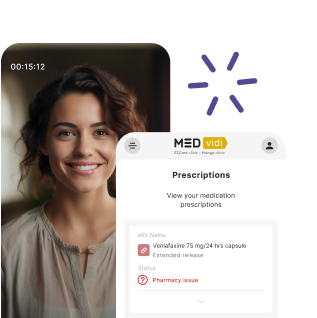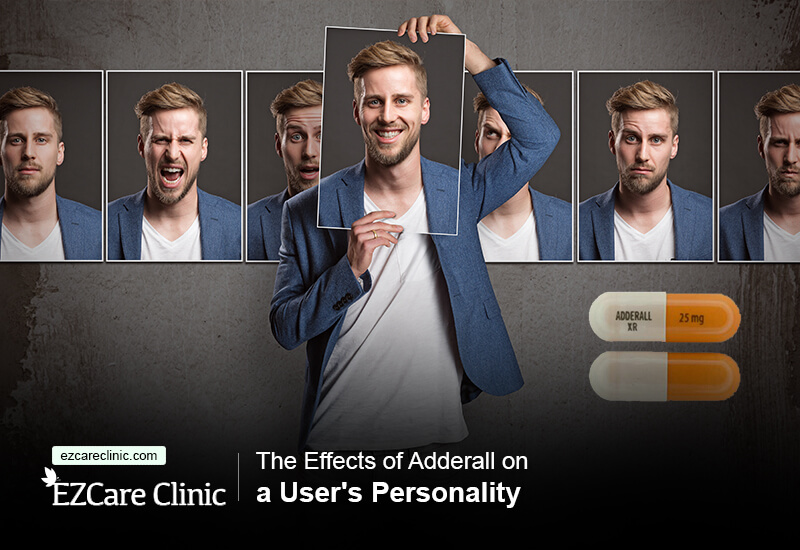Depression can arise for various reasons, but it is usually associated with low levels of serotonin and norepinephrine in the brain. To raise them to normal concentration, doctors may prescribe Effexor (venlafaxine). This medication is approved for major depressive disorder, generalized anxiety disorder, social anxiety disorder, and panic disorder treatment. Below, let’s learn more about venlafaxine and how it works for depression.
Get professional help online

What Is Effexor?
How It Works
Being a type of antidepressant called SNRI, Effexor regulates both serotonin and norepinephrine in the brain. These neurotransmitters play an important role in mood, behavior, and emotion regulation.
Effexor blocks the reabsorption of serotonin and norepinephrine back to nerves, helping raise their levels in the brain for longer periods of time. As a result, Effexor exerts a dual antidepressant effect: it helps to improve mood and alleviates symptoms associated with anxiety and depression.
Forms
Depression medication venlafaxine is available in the form of tablets and capsules and has an immediate-release form (Effexor) and extended-release form (
Effectiveness
The pharmacodynamics of Effexor have a unique effect on the body. This medication may help treat the types of depression that show drug resistance to other antidepressants. A
How to Take?
Antidepressant medication Effexor (venlafaxine) should be taken exactly as prescribed by a healthcare provider to increase the chances of treating depression effectively. The dosage depends on the individual’s condition and response to treatment.
Effexor is taken orally, with or without food, once or twice daily. It’s essential to take venlafaxine at the same time each day to maintain consistent blood levels. It can be taken anytime, whether morning or night, and you can discuss the most appropriate schedule with your healthcare provider if you face any challenges with that.
The extended-release capsule whole should be swallowed without crushing or chewing, to ensure proper release of the medication.
Remember that it may take several weeks to experience the full benefits of Effexor, so continue taking it as directed for the prescribed length of time even if you don’t feel significant positive changes. Stay in touch with your doctor to discuss any concerns.
Dosage
Standard venlafaxine tablets are available in 37.5 mg and 75 mg dosages, while slow-release Effexor capsules are available in 37.5 mg, 75 mg, and 150 mg doses.
In most cases, medical professionals begin with prescribing a low Effexor dosage and gradually raise it until they find the most effective one. They give prescriptions this way to lower the likelihood of experiencing adverse effects.
Always follow the healthcare provider’s instructions and never adjust the dosage without consulting them.
Missing a Dose
Patients can take Effexor as soon as they remember after missing the dose. But if it’s almost time for their next dose, they should skip the missed dose. Taking two doses at once to compensate for a missed one can lead to overdosing. If they are on the extended-release form dosage, they must not take more than one dose daily.
What to Do in the Case of Overdose
In cases, when someone takes more of the medication than prescribed or more than the maximum dose, it could lead to potentially dangerous levels of the drug in the body. Signs of an Effexor overdose can include:
- Severe drowsiness
- Convulsions
- Seizures
- Tremors
- Rapid or irregular heartbeat
- Shortness of breath
- Coma
Effexor overdose can be life-threatening and requires immediate medical intervention. Anyone in close contact should call 911 if they suspect someone has overdosed and has severe symptoms like losing consciousness or breathing problems.
Stopping the Medication
There are several reasons why a healthcare provider may recommend stopping the depression drug venlafaxine (Effexor). It can happen when it’s time to complete successful treatment or, on the contrary, when the use of this medication is not as effective as expected or causes severe side effects.
Regardless of the reason, it’s important to never stop using Effexor cold turkey but seek guidance from a healthcare professional. Supervision helps to minimize the risk of experiencing withdrawal symptoms.
If a patient has used a higher than minimum venlafaxine dosage for a long time, healthcare providers typically recommend a tapering schedule, lowering the dose of venlafaxine gradually over several weeks. This approach allows the body to adjust to the reduced levels of the medication.
The tapering schedule may vary depending on the dosage, how long a patient has been taking the medication, and their individual response to tapering. It’s essential to communicate any symptoms occurring during the tapering process to decide whether it’s necessary to adjust the tapering schedule accordingly.
Withdrawal
The tapering process discussed above has several positive effects. These include stabilization of symptoms, prevention of rebound effects or relapse, and reduction of withdrawal symptoms. Some patients may still experience
Common withdrawal symptoms related to venlafaxine include:
- Dizziness
- Headaches
- Irritability
- Vomiting
- Nausea
- Insomnia
Side Effects
Just like any other medication, Effexor can cause side effects. Not every patient experiences them, and people taking the same dosage for the same condition can have different symptoms. But, it’s essential to know about these potential adverse reactions to monitor them and seek help promptly if needed.
Common Side Effects
Many side effects of Effexor are common and mild, they are typically not prolonged and fade away as the body adjusts to the medication. However, patients should notify the doctor right away if any of these bad side effects of venlafaxine persist or worsen:
- Nausea
- Dizziness
- Headaches
- Fatigue
- Insomnia
- Dry mouth
- Constipation
- Blurred vision
- Weight loss or gain
- Changes in sexual function
- Increased sweating
Serious Side Effects
Severe side effects from using Effexor rarely occur. A patient should inform the doctor immediately if they experience one or more of these:
- Intense anxiety
- Rash
- Hives
- Difficulty breathing
- Chest pain
- High blood pressure
- Kidney problems
- Seizures
Warnings
9.5% of the American adult population suffers from depression every year, so it’s obvious there is no single medication that can suit everyone. Effexor also has specific warnings and precautions one should be aware of. They include the following:
- Worsening depression and suicidal thoughts. Effexor may increase the risk of suicidal thoughts or make a depressive episode more severe. Healthcare providers should monitor the patient’s response to medication carefully, especially during the early stages of treatment or when changing the dosage.
- Risk for individuals with bipolar disorder. Venlafaxine can activate symptoms of mania or hypomania in individuals with bipolar disorder. It is important to screen patients for bipolar disorder before starting treatment.
- Serotonin syndrome. Serotonin syndrome is a potentially life-threatening condition characterized by excessive serotonin levels in the body. Symptoms may include agitation, hallucinations, rapid heart rate, elevated blood pressure, fever, excessive sweating, shivering or shaking, blurred vision, muscle spasms, tremors, incoordination, nausea, vomiting, and diarrhea. It’s critical to seek immediate medical attention if any of these symptoms occur.
- Hypertension. Effexor may cause an
increase in blood pressure[5] in some people, especially when taken at higher doses. Patients should regularly monitor blood pressure during treatment, particularly if they have pre-existing hypertension. - Angle-closure glaucoma. This medication may increase intraocular pressure. That is why it should be used with caution in individuals with angle-closure glaucoma or a history of this condition.
- Allergic reaction. Some individuals may experience allergic reactions to Effexor. Individuals with a known allergy to venlafaxine or any of the inactive ingredients in Effexor should not take the medication and should discuss alternative treatments with their healthcare provider.
- Breastfeeding. Effexor is excreted into human breast milk, so inform your doctor if you are a nursing mother. A healthcare provider will evaluate the risks and prescribe safer alternatives.
- Pregnancy. Effexor is classified as a category C pregnancy medication. Your healthcare provider can better assess the potential risks and benefits of prescribing Effexor and offer alternative medicines.
Precautions
When taking Effexor, take precautions if you have:
- Seizures, brain damage, and other brain conditions. Doctors associate taking Effexor with an increased risk of seizures.
- History of mania. Taking Effexor can increase a person’s chances of experiencing mania, so careful assessment for bipolar disorder is necessary before prescribing it.
- Cardiovascular disease, hypertension, or low blood pressure. On rare occasions, Effexor can worsen these conditions.
- Kidney and liver diseases. The risk of adverse effects of venlafaxine increases if the drug reaches high levels in the blood due to kidney or liver dysfunction. The patient may require a dose adjustment determined by a qualified healthcare provider.
Interactions
Drug and food interactions can alter the effectiveness of Effexor and increase the risk of adverse effects.
Patients should inform their doctor about all the medications they are currently taking, including supplements, vitamins, and natural remedies. The doctor should also monitor the patient for complications during the follow-up appointments.
Drug Interactions
Effexor has shown interaction with some drugs in major or minor ways:
- Monoamine oxidase inhibitors (MAOIs). During the two weeks before and after using Effexor, the patient should not use MAO inhibitors such as selegiline, isocarboxazid, or phenelzine.
- Serotonergic drugs. It’s essential to be cautious while combining venlafaxine with other medications that alter serotonin levels because it can lead to serotonin syndrome. These include MAOIs, SSRI antidepressants (selective serotonin reuptake inhibitors), buspirone, tryptophan, fentanyl, amphetamines, St. John’s Wort, lithium, tramadol, and triptans.
- NSAIDs, warfarin, and anticoagulants. Effexor may increase the risk of bleeding when used with anticoagulant medications like warfarin, aspirin, and other NSAIDs.
- CNS depressants. Combining Effexor with alcohol or other central nervous system (CNS) depressants, such as benzodiazepines or opioids, increases the risk of central nervous system depression, respiratory depression, and impaired cognitive function.
Food and Alcohol Interactions
Patients can take their depression medication Effexor with food and not be afraid of any interactions. But it’s important to avoid alcohol while taking Effexor as it can increase the risk of side effects.
Storage Recommendations
Effexor should be stored at controlled room temperature, ideally between 68-77°F (20-25°C). It’s important to keep it away from excessive heat, moisture, and light, which can degrade the medication. Keep the medication out of reach of children and store it in its tightly closed original container to protect it from both air and humidity. Do not transfer it to other containers unless instructed by a doctor or pharmacist.
It is important to follow storage recommendations to help maintain the effectiveness and safety of Effexor for optimal treatment outcomes.
Final Word
Effexor is generally a well-tolerated medication with proven effectiveness. It can be prescribed to treat depression and several other mental health issues. However, it might cause side effects and has several warnings, precautions, and drug interactions, so it’s important to inform your healthcare provider about any co-existing health conditions and medications you are taking. Sometimes, they will recommend another medicine.
Contact MEDvidi today to schedule an appointment and learn what medication can help you best in managing depression.
FAQ
Do you gain weight with Effexor?
Effexor affects neurotransmitters in the brain, which can influence appetite and metabolism. So, weight gain is a possible side effect of Effexor, but it doesn’t happen to everyone. Some individuals may experience weight gain, while others may not notice any changes in body mass.
Is venlafaxine the same as Xanax?
No, venlafaxine is not the same as Xanax. Venlafaxine is an SNRI antidepressant, whereas Xanax contains alprazolam, which is a benzodiazepine. While both venlafaxine and Xanax can be used to treat certain types of anxiety disorders, they work in different ways. Venlafaxine affects serotonin and norepinephrine to regulate mood, while Xanax affects GABA to produce calming effects and relieve symptoms of depression and anxiety.
What are the benefits of taking it?
The benefits of taking Effexor include improved mood and alleviation of symptoms associated with depression and anxiety. Some individuals may find that it causes fewer side effects compared to other antidepressants, although this can vary depending on the person.
Also, the benefits of Effexor XR (extended-release) formulation include smoother concentration levels, which leads to a reduced likelihood of withdrawal symptoms between doses.
How does it make you feel?
Effexor can significantly improve your overall mood, reducing feelings of depression and anxiety. You may experience increased energy and motivation. You may also notice improvements in your appetite, sleep patterns, and breathing. However, in some patients, venlafaxine may cause side effects, so it’s important to discuss disturbing symptoms with a healthcare provider.
In addition, note that it may take up to a few weeks for Effexor to show full effects. So, if you don’t notice a significant improvement, it can be a normal treatment process, and you should not stop Effexor without consulting with your medical provider first.
Can venlafaxine be used for sleep?
Venlafaxine doesn’t primarily treat sleep disorders, but it may indirectly improve sleep in some individuals. Consult your healthcare provider for appropriate treatments tailored to specific sleep issues.
What symptoms does it help with?
Effexor is prescribed to alleviate the following symptoms:
- Depression symptoms: Persistent sadness, feelings of worthlessness, loss of interest, appetite and weight changes, sleep disturbances, fatigue, difficulty concentrating, and suicidal thoughts.
- Anxiety symptoms: excessive worry, nervousness, restlessness, and panic attacks.
What is the difference between Effexor XR and regular?
Antidepressants Effexor XR (extended-release) and Effexor (immediate-release) are both formulations of the same medication, venlafaxine. Effexor is designed to release the medication rapidly, resulting in fluctuations in blood levels throughout the day and requiring multiple doses for maintaining therapeutic levels. In contrast,













